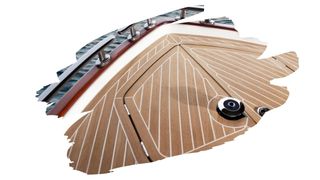If you own a piece of Teak wood garden furniture, you probably already know that this lumber can handle the outdoor elements all year round.
That’s because when you get right down to it, Teak wood has a lot of natural water-resistance and high durability. This makes it an exceptional choice for boats, exterior buildings and other outdoor constructions.
And this should come as no surprise. After all, Teak wood is a very oily wood – so oily in fact that it doesn’t need a finish (such as Linseed oil or Tung oil) to help waterproof it.
In other words, this timber type comes with its own natural water-repellent ‘finish‘ as standard.
So, if this rot-resistant lumber can shrug off the perils of extremely wet conditions all by itself, why would you need to apply lemon oil on teak wood?
In short, you don’t need to apply any kind of oil treatment on teak wood – and that includes lemon oil. Lemon oil, (which is basically mineral oil with lemon oil drops added to it), is used as a conditioning oil.
When Lemon oil is coated onto wood surfaces, it’ll saturate parched, dry wood. And as it permeates wood grain, it nourishes and enhances it back to its original beauty.
Now, Teak wood, is already naturally packed to the brim with its own oils. So much so, that even adhesives such as wood glue can’t stick to it. Yes, it is seriously that oily.
So, soaking teak lumber in lemon oil will offer up no benefits at all (at best) and will be a compete waste of time.
Which begs the question; what finish should you use instead to protect teak wood from those outdoor elements?

This post may contain affiliate links to products that we receive a commission for (at no additional cost to you). Learn more here.
Should We Be Oiling All Of Our Outdoor Teak Furniture And Decks?
Outdoor teak wood projects, furniture, and decking do not need any oil finish. This wood comes with its natures-own oil that readily saturates it throughout.
Now, that is not to say that this wood is 100% waterproof. Those open wood pores will still let in water.
But the difference is, unlike with most other types of wood, that water won’t soak into and swell those Teak wood fibers.
When wood fibers swell up, (and then dry out afterwards), this causes wood to twist, warp, and become unstable.
And if those wood fibers do not even manage to dry out fully, then rot and decay can set in.
Related Post: What To Do When Solid Wood Cabinet Doors Start Warping (Solved!)
But, thanks to Teak woods water-repellent oiliness, water doesn’t get soaked up by its wood fibers in the first place. Which means that rot, decay, warping, and even termite damage, aren’t an issue.
It Still Feels Wrong To Leave Outdoor Teak Wood So Bare. Can’t I Use Lemon Oil On Teak Wood Anyway?
If you have time to burn, sure you could. It would be a waste of effort though.
Lemon oil doesn’t help teak wood last longer. This lumber does fine on its own. In fact, that teak wood deck will likely outlast us all.
Why? Because if you left a single bare teak wood board outdoors, it can last 75 to 100 years before it rots away.
What Oils Can Be Used On Teak? Nothing, it doesn’t need any.

OK, But Does Lemon Oil Work For Teak Wood Indoor Furniture?
No, lemon oil doesn’t work indoors either because Teak wood doesn’t need it full stop.
That includes teak wood that’s been used to make boat decking, a shower unit, a garden chair, or a kitchen table.
So To Sum Up…
If you’ve got some teak wood boards, (or have a teak deck project in mind), feel free to build without having to worry about oil finishes.
Good luck!

